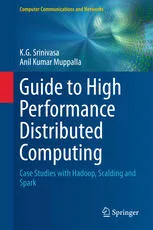Guide to High Performance Distributed Computing: Case Studies with Hadoop, Scalding and Spark
5.0
Reviews from our users

You Can Ask your questions from this book's AI after Login
Each download or ask from book AI costs 2 points. To earn more free points, please visit the Points Guide Page and complete some valuable actions.Introduction to "Guide to High Performance Distributed Computing: Case Studies with Hadoop, Scalding, and Spark"
Distributed computing has emerged as the backbone of modern technological advancements, enabling organizations to process massive amounts of data efficiently and effectively. In a world dominated by data, understanding distributed systems is no longer optional but rather a critical skill for developers, engineers, and data scientists. This book, "Guide to High Performance Distributed Computing: Case Studies with Hadoop, Scalding, and Spark," is meticulously crafted to meet this need. It delves deep into the fundamental principles of distributed computing while offering practical insights using three powerful tools: Hadoop, Scalding, and Spark.
Authored by K.G. Srinivasa and Anil Kumar Muppalla, this book combines theoretical frameworks with real-world applications, making it an invaluable resource for students, professionals, and researchers. Whether you are new to distributed systems or looking to refine your expertise in big data technologies, this guide provides a solid foundation paired with actionable knowledge.
Detailed Summary of the Book
This book focuses on unraveling the complexities of distributed computing, an area that can often seem daunting to newcomers. It begins by establishing the historical evolution of distributed systems and their exponential rise with the advent of big data. The authors introduce readers to the hardware and software paradigms essential for distributed computing, treating topics ranging from system architectures to programming models.
The core of the book revolves around three major tools: Hadoop, Scalding, and Spark. Each of these is explored in detail, with a focus on understanding their underlying principles, installation setup, and real-world applications.
- **Hadoop:** The authors break down the Hadoop ecosystem, emphasizing concepts like the Hadoop Distributed File System (HDFS) and MapReduce. Readers are guided through writing MapReduce jobs, tuning performance, and leveraging Hadoop’s scalability.
- **Scalding:** A chapter is dedicated to this high-level abstraction tool for cascading. Readers learn how Scalding enables more intuitive programming for distributed data pipelines without the hassle of writing low-level MapReduce code.
- **Spark:** Finally, Apache Spark, one of the fastest and most versatile distributed computing tools, is thoroughly explored. The book covers Spark's programming models (RDD, DataFrames), optimizations, and its applications in machine learning, graph processing, and stream computation.
Additionally, the book is augmented with case studies and examples that help ground theoretical concepts in practical usage scenarios. These case studies range from processing financial transactions to analyzing social media data, offering readers practical applications they can relate to and learn from.
Key Takeaways
After completing the book, readers will gain a profound understanding of how to design, implement, and optimize distributed systems in a high-performance environment. Some of the key takeaways include:
- Master concepts of distributed file storage, fault tolerance, and data replication.
- Learn the intricacies of Hadoop, including MapReduce workflow development and ecosystem tools.
- Understand Scalding and how it simplifies workflow development for large-scale data processing.
- Develop expertise in Spark, covering topics from RDD fundamentals to advanced use cases in machine learning.
- Gain practical knowledge through integrated case studies, preparing for real-world applications.
Famous Quotes from the Book
"Distributed computing transforms static data into an actionable asset. Like a finely tuned orchestra, each component must work harmoniously to create value."
"The strength of a distributed system lies in its ability to embrace failures while ensuring seamless execution of complex tasks."
"Big data is not about the size of the data; it is about deriving meaningful insights from it. Tools like Hadoop and Spark merely unlock those possibilities."
Why This Book Matters
As organizations generate data at an unprecedented rate, there is a growing need for systems and professionals capable of processing it quickly and efficiently. This book addresses the gap between traditional computing methods and the demands of high-performance distributed systems.
What sets this book apart is its unique blend of theoretical depth and practical case studies. Readers are not only introduced to the foundational concepts of distributed computing but also encouraged to implement and experiment with them. Technologies like Hadoop and Spark, though widely used, can be overwhelming for beginners. This guide demystifies these systems, providing step-by-step instructions and practical tips to bring readers up to speed seamlessly.
Whether you are a researcher looking to harness distributed computing in your projects, a student preparing for a career in big data, or a professional aiming to scale up your organization's computational capabilities, this book offers tools, techniques, and perspectives that are invaluable in mastering distributed computing.
Free Direct Download
Get Free Access to Download this and other Thousands of Books (Join Now)


